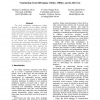Free Online Productivity Tools
i2Speak
i2Symbol
i2OCR
iTex2Img
iWeb2Print
iWeb2Shot
i2Type
iPdf2Split
iPdf2Merge
i2Bopomofo
i2Arabic
i2Style
i2Image
i2PDF
iLatex2Rtf
Sci2ools
HICSS
2011
IEEE
2011
IEEE
Negotiating Social Belonging: Online, Offline, and In-Between
This study investigates contemporary college students’ social behavior on- and offline. Although being socially active typically enhances access to resources embedded in social networks and improves student performance, the relative contributions of a range of social activities to students’ social and academic lives remain unclear. Additionally, the broad adoption of communication technologies such as cell phones and Internet-based applications including social networking sites (SNSs) is changing the way people manage their social lives. In light of these changes, the current study explores the relationship between a variety of social activities, perceived support and performance outcomes. Results suggest that a range of activities significantly correlated with student outcomes. Mediated relationships via SNSs had a positive influence on perceived social support, whereas time spend communicating face-to-face demonstrated a positive relationship with satisfaction.
| Added | 20 Aug 2011 |
| Updated | 20 Aug 2011 |
| Type | Journal |
| Year | 2011 |
| Where | HICSS |
| Authors | Michael A. Steafnone, Yu Chao Huang, Derek Lackaff |
Comments (0)

